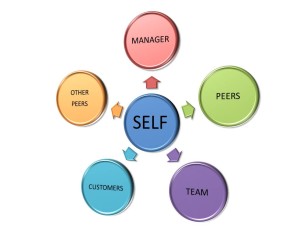Have you thought of how your leadership should be skilled outwardly in all directions, communicating effectively with all those around you?
In order to lead well, you have to be able to communicate, appreciate and adapt your style for your manager, peers and direct reports, but also to customers, internal departments, stakeholders and service providers. And it all starts with understanding yourself.
You’re going to need to be able to build relationships, and influence, negotiate with, empower and engage those around you. Therefore, one of the most important characteristics of a good leader is self-awareness. It’s important to understand what triggers motivation, stress and specific reactions in yourself, and helps or hinders your decision making. Additionally, what you believe about yourself and others (both positive and negative) is not only going to affect your behaviour and leadership style, but also the way you see and work with others around you.
There are two steps to the 360 Degree Leadership Programme.
Step One: to develop the skills needed to communicate effectively with all relationships in the circle. All communication can be enhanced by understanding and appreciating the differences of individuals in terms of:
- Motivational needs and “towards” or “away from” situations.
- Beliefs and values – understanding positive and negative beliefs at play and the non-negotiable management and leadership rules and values which need to be maintained even when under pressure. e. What is the line that cannot be crossed.
- Cognitive biases – the unconscious ‘rules of thumb’ that people acquire from experience that act as shortcuts to making decisions instead of making exhaustive evaluations of relevant information.
- Working preferences – organised and structured versus flexible and spontaneous
- Preferences on how to handle conflict.
- Learning and language styles which need to be incorporated into your communication i.e. visual, auditory, kinaesthetic.
- Building an environment of trust, honesty, openness and learning from successes and mistakes.
Step Two: to understand the specifics for each group within the 360? So this could cover your manager, your peers, your customers, inter-departmental relationships and other peers relevant to your specific department or organisation (such as service providers, stakeholders, regulators).
See article which covers the example of “Managing Upwards”.
PROGRAMME
Understanding the communication skills and leadership skills for 360 degree leadership can either be coached through 1-2-1 executive coaching sessions or a Workshop for up to 6 attendees.
For the Workshop option, in order to provide the best solution for your organisation, the programme structure is divided into four distinct parts, which should have a minimum of one week between in order to practice the learning.
- Optional half day workshop for all attendees to understand their MBTI type.
- Full day workshop for attendees to gain self-awareness and understand “brain-friendly” communication techniques – including motivational needs and cognitive biases.
- Full day workshop for attendees to understand effective communication skills that can be transferred to all 360 degree relationships.
- Full day workshop to understand the specifics for each relationship within the 360 degrees and put it all together.
One area we excel in is getting delegates to commit to using and applying the ideas and techniques covered in the coaching. Attendees will leave the coaching with the confidence to apply what they have learned and be inspired and motivated to put it into action in the real world.
If you are interested in finding out more about the 1-2-1 coaching or workshops, then please contact us for an initial discussion.

